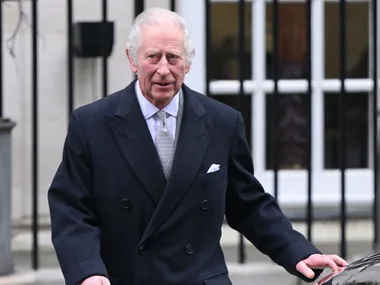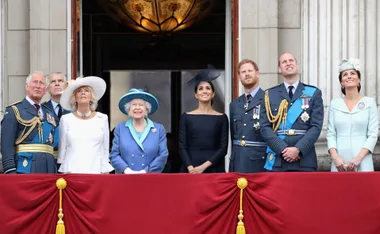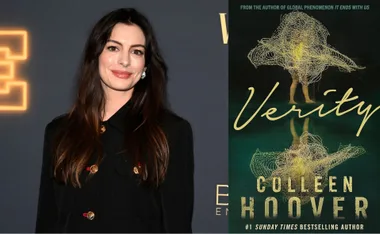Almost French by Sarah Turnbull (Random House $22.92) is the Book Of The Month in The Australian Women’s Weekly, April issue. It is a vivid, funny, sometimes teary account of the adventures of an Australian who falls in love with a Frenchman and goes to live in Paris.
Q What made you write this book? A I had the idea for quite a while, before I did anything about it. In the first place it was friends and family – every time I came back to Australia, I’d tell them stories about things that had happened in Paris and they’d say you should write a book about that! But when it comes from people like that, who are close to you, you go ‘oh yeah!’ But you don’t take them seriously.
I guess I started seriously thinking about it after I went to W.H. Smith, the English bookshop in Paris and bought a lot of books on France. I suppose I was not so keen on writing the book in the first place because I thought there were already a lot of books about France – is there anything more to say? Only when I started reading these other books did I come around to the idea that ‘yes,’ there is room for writing something a bit fresh, a bit different without it being ‘quaint,’ because I don’t think life in Paris or France is necessarily ‘quaint.’ It’s fascinating and it’s many wonderful things.
I think that changed how I perceived the book. I became more confident about the idea after I’d bought half the stock at W.H. Smith! I started believing in it then.
Q Were there many books by foreigners living in France? A In the genre, Under The Tuscan Sun comes to mind, and then of course there was the book on Provence by Peter Mayle…I don’t think there have been that many by someone actually living in France or Paris. I think a lot of them have retired and bought a house that they do up. There’s quite a bit of that genre.
I guess I always felt one of my strengths was Fred. Having a French partner which gave me an insight into the whole French side of things, with his family and French friends which was quite confronting initially but also fantastic.
Q You call him Fred in real life, not Frederic as you call him in the book? A Yes. I do say in the book that when I first arrived in France I had trouble with pronouncing his name because of the two ‘R’s.’ What I didn’t say is that I still have trouble and so ‘Fred’ stuck. Unless I really concentrate, I still can’t say it properly.
Q When you first went to Europe it was for a year, so I imagine you were surprised to find a holiday turned into something permanent? A Yes, you never look that far ahead. I think often in life you make quite big decisions without realising they are big decisions. I was in backpacker mode and not ready to go back to Australia. I’d had a lovely holiday with Fred and I was not ready to end the relationship by any means. And so staying sounded like the sensible thing to do. I didn’t know what was in store. I didn’t think of how difficult it was going to be. It was a different city when I came back to settle here from the one I’d visited in August. It was winter and bleak and I realised it was quite a different thing to come back and settle here rather than visit. All of a sudden I was confronted with the reality of making my life in France. Then I began to think, ‘hang on, this might not be so easy.’
People think of Paris as small and being quite contained and not intimidating, other than the fact that people speak French. I’d been there quite a few times and I knew Fred and I knew what French people were like so it would be quite easy. Of course I was completely naive, it was much more difficult than I expected.
Apart from the usual thing of moving to a new country, there was also the challenge of finding work and getting set up as a freelance journalist. But I think that there are things about France that do perhaps make it more challenging. The fact that you feel it’s all familiar makes it all the harder when you do confront things that you just simply don’t understand. You find yourself at a dinner party say, everybody’s speaking rapid fire French, you can’t understand a word and you feel completely alien. Terribly alone.
When I first arrived I didn’t want to hang out with other Aussies or foreigners. I wanted to have a bunch of French girlfriends, I thought that would come quite easily. When that didn’t happen I met up with some other foreigners living in Paris and that was very helpful because we were all having the same experiences and same problems. Talking to them (laughing) made me feel I wasn’t the only loser going through these difficulties.
Q How did you get the book published? A Because it was my first book, I really had no idea how it worked. So I wrote an introduction of 1500 words and sent that with a proposal to about six publishers. And to the literary agents, Curtis Brown. I think nearly all of them got back to me, saying pretty positively that they were interested in the book. On my next visit to Sydney I met with Random House and that was very helpful because the woman there gave me some very good advice. She said ‘I think it could work. But you’re going to have to put more of yourself into it.’ Being a journalist who had very rarely ever written the word ‘I’ before, I was very loathe to make it personal. In fact in the first version Fred didn’t even have a name – he was ‘the lawyer.’
But if there was one thing I found difficult about writing a book it was that – that whole aspect of writing about my life. There were various stages where I completely freaked out and resisted it. Funnily enough Fred was fine about it, but I didn’t necessarily want our arguments aired dialogue- style in a book.
Q Was Fred the first person to read the finished manuscripts? A Fred read many drafts along the way. And came up with a lot of good ideas. My friend the fashion journalist who I talk about in the book, was also great. And friends and family back in Australia also read drafts and made suggestions.
Q I loved, Maddie, the ‘wonder’ dog in the book and the way everyone in Paris fauns over her. A Maddie the stubborn dog, you mean. But it was funny and unexpected, the way she opened a whole new, weird world in Paris for me.
Q Are you still working as a freelance journalist? A I haven’t been, I decided to take off time for the book – I think it’s been about a year and a half all up. Now I’m starting to get back to it again. I’d reached the point where I was happy to stop doing articles. It can be tricky freelancing and I was happy to take a break.
Q How did you organise your day when you were writing the book? A I had set hours. If I felt it wasn’t going anywhere I’d take Maddie out for a walk. I go down to the cafe first and have my coffee at nine o’clock. I would sit there watching the street entertainment, all the food deliveries rolling up and then I’d go back to my office and work till about six or seven. And then go to the gym – two or three nights a week. I gave myself monthly deadlines.
Q The title is yours or the publishers?A To be honest we were having trouble coming up with a title. They didn’t like mine and I didn’t like theirs. Time was running out. Then one day I was reading some film reviews and there was one called ‘Almost Famous’ – so I adapted that. It said everything I wanted to say. That whole struggle of integrating into a new country and realising you will only ever be ‘almost’ and perhaps that’s okay.
Although I had this interesting experience recently…we’d only just come back to Paris from Australia where we’d enjoyed a few weeks, to this grey, bleak, wintry weather and I had an attack of post holiday blues. Then I went down to the market and straight away the cheese man called out ‘how did that cheese go down that I vacuum packed for you? Did everyone like it in Australia?’ And people started calling out, ‘how was your holiday?’ And I suddenly thought, ‘yes, this is my home.’ It was lovely, gave me a sense of belonging.
Q You are obviously fluent in French now and that’s made a big difference? A Yes, that was crucial. Remember too there was the incentive in that in the beginning, I was with a Frenchman whose English wasn’t that great but it was better than my French. But Fred’s English wasn’t wonderful so speaking in English wasn’t an option. I had to learn to speak French quite quickly. Also, back then we only had French friends and I’d end up at the end of a night out without having said a word. Not because they wanted to be rude, they just didn’t think at all of slowing down so that I could understand or stopping to explain things. So I’d finish up sitting around a table for four hours, not having a clue what was being said. You get tired of just sitting there nodding, so I did have to learn pretty quickly.
Q You were born and raised in Australia? A No, I was born in Texas, in the US because my father was in the military, an airforce pilot. My older brother and younger sister were born in Singapore. In fact I grew up mainly in Canberra in between overseas postings. I did a lot of my schooling in Canberra and went to university at the ANU where I did an Arts degree. Ironically, I remember being advised to drop French…
Q The thing you love most about returning to Australia? A The people. Friends and family. I have this need to go back to Australia every year. I have to do it. I’m lucky, my parents live near the beach and it’s just beautiful there. There are many wonderful things to do in Paris, but you can’t duplicate friends and family.
Q The thing you love about Paris? A I love the quarter, the neighbourhood where I live. Living in a market street. There’s so much life, it’s so entertaining. It’s a part of Paris that still has the village atmosphere and that has given me tremendous happiness.
Q Do you have an idea for another book? A I’d like to think I could write another book, but it won’t be of this genre. But I only have vague ideas at this stage.
Q Maddie must have loved you being at home longer than normal, writing the book? A Depends. When I’d go out to do interviews, especially if it was a fashion one, I’d take Maddie with me and they’d just love it. One day I had to go into a fashion house to pick up something and the girl asked eagerly, ‘are you going to bring your dog?’ She loves the attention of course, plays up to it incredibly. She probably thinks writing books is incredibly dull because she misses her outings.
Q Are children a part of your plans? A Yes we’d like to have them at some stage… we’ll see what happens.
Q Unfulfilled ambitions? A I don’t think like that. I’m not one for setting goals – I just think whatever you do, do it as best you can.
Q Has Paris changed you in any way? A My fashion journalist friends were only teasing me recently because I was wearing some new boots and she was laughing, saying compare those with those Doc Martens you wore when you arrived in Paris. These have a pointy toe and a bit of a heel – I’m still not into heels, but they’re nothing like the clumpy shoes I got around in when I first arrived. So I’m sure there have been some changes there. French clothes tend to be very tailored and quite feminine and I think it’s quite natural to wear things that are a bit more snug or tight fitting.
Q Are you slender? A Yeah, I’m a little person. So I’m lucky I can fit into them, some of my friends from Australia find it hard to find French clothes to fit.
Paris has changed me in some ways profoundly as well and yet when I’ve asked people back home they say you’re still the same. I think anyone who’s ever lived abroad, the things you see and experience do change you – make you stronger and hopefully, more open minded.
When you first arrive in France you react against it. You make rash judgements. And you think the French are this or that, because you don’t understand. Because you feel hurt. Then, as you get to know the language and the French character things change. And I think with time, you realise there is no malice intended, it’s simply a different culture and it’s up to you to learn about and come to understand it.
Q Do you have any advice for anyone going to Paris? ADon’t take offence at the attitudes, would that be a good tip for starters? A Yes, although I do think there has been a marked change in Paris with regards to foreigners. My parents have noticed it. While a couple of words of French would be nice, Parisians are much more willing to speak English now. There has been a slow opening up in the seven years I’ve been here. I think if people are coming to live here the advice I’d give is don’t give up. I’ve spoken now to so many foreigners who have moved here and I’ve discovered that it’s normal to find it difficult and confronting. They all agree it’s a lot more difficult than you expect – and then you come out of it.
Q And then you fall in love? A Absolutely. The other thing is living in France or any foreign country, there are still things that can surprise you, that you don’t understand because you don’t still don’t know all the culture or even share the same history, or background. There is an underlying tension which makes it more exciting. It is also a wonderful thing. It makes it an adventure.
Q Long term where do you see yourself? A At one stage we’ll come back and live in Australia, at least for a while. If nothing else, so that I can be close to my family and friends and Fred is very open to that idea. One problem is that Fred is the main bread-winner and I don’t think there’s much work for French lawyers in Australia.
Q He can take some time off, then? A Yes, he loves that idea in fact. He’d love to do more painting – he paints in water colours – and he likes to draw.
Q That’s not you on the cover of the book? A No.
Q You had a lot of tough times settling into Paris, ever get close to jumping on a plane and coming back and if not, what stopped you? A It crossed my mind a couple of times. But it never ever was really an option.
Q What stopped you? A I think part of that answer obviously was Fred. And I have to say that even though when I was feeling at my bleakest, I still did believe it would work out. That I could be really happy in France. I just had to get through this. And I did that with the help of a few close girlfriends – we’d go out and drink too much house wine.
Q I felt by the end of the book you’d come to understand something about your own Australian-ness? A Yes. Having lived abroad quite a bit, I’d never really thought of myself as very Australian, but living here has made me realise I am definitely more Australian than I thought. Things like being more direct and an attachment to things being more relaxed.
Q How many countries did you live in growing up? A Singapore, Surry in England and Montgomery, Alabama in Texas, which was quite strange.
Q Did your nomadic upbringing make it easier for you to move to France? A I always thought it had made me more flexible, but it didn’t. So part of my initial reaction to Paris was ‘well hang on, I’m supposed to be good at this. Why isn’t this working?’
Newsletter conversion description. Get the latest in your inbox.
















































